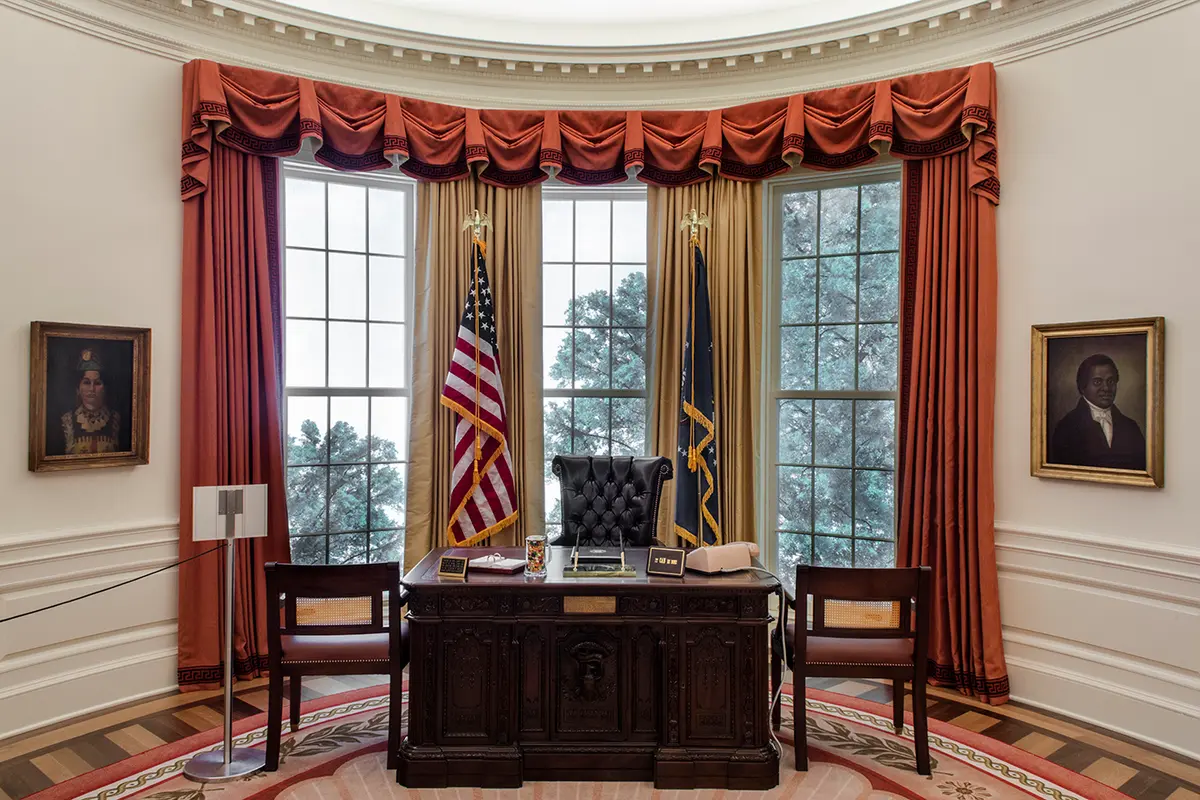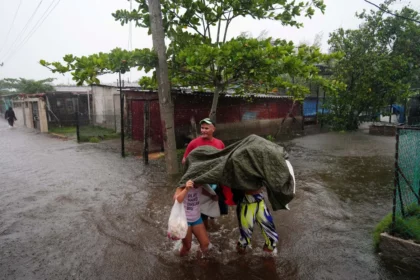US President Joe Biden and former President Donald Trump will face each other in the US presidential election on November 5 in what looks set to be a divisive, closely clashed contest. Several third-party candidates are also running.
Here is a list of the candidates:
Donald Trump
Donald on May 30 became the first former US president to be convicted of a crime when a Manhattan jury found him guilty of falsifying documents to cover up a payment to silence a porn star ahead of the 2016 election. He plans to appeal and says he’s innocent.
He will be sentenced on July 11, four days before the start of the Republican National Convention, where he is due to be formally nominated to face Biden, having secured enough delegates to set up the first presidential rematch in nearly 70 years.
Trump, in office from 2017-2021, has leveraged his unprecedented legal challenges to solidify support among his base and has cast his third bid for the White House in part as retribution against perceived political enemies. But following his felony conviction, 10 percent of Republican registered voters said they were less likely to vote for him, rising to 25 percent among independent registered voters, according to a Reuters/Ipsos poll.
Trump faces 54 charges in three other criminal cases: a federal case involving efforts to subvert the 2020 election, a Georgia election interference case and a federal case in Florida over his handling of classified documents after leaving office. He denies wrongdoing in all the cases.
However, the New York hush money trial could be the only one to take place before the Nov. 5 election.
Trump has refused to commit to accepting the 2020 election results or to rule out possible violence around the Nov. 5 contest or his sentencing and is already laying the groundwork to contest his potential election loss.
He calls supporters jailed for the Jan. 6, 2021, attack on the US Capitol “hostages” and campaigns using increasingly dystopian rhetoric. If elected to another four-year term, Trump has vowed revenge on his political enemies and said he would not be a dictator except “on day one,” later calling that “a joke.”
He also wants the power to replace federal civil service workers with loyalists. On foreign policy, Trump sparked criticism from Western leaders for saying the US would not defend NATO members who did not spend enough on defense and would encourage Russia to attack them.
He also pressed congressional Republicans to stall military aid for Ukraine before later reversing course.
Trump has made immigration one of his top domestic campaign issues, declaring he would carry out mass deportations, utilize the National Guard and possibly federal troops, end birthright citizenship, and expand a travel ban on people from certain countries.
He has referred to some migrants as “animals” and has not ruled out building detention camps on US soil. On abortion, Trump takes credit for the US Supreme Court ruling overturning Roe v. Wade and has said it should remain a state issue.
While he has criticized some Republican-led state actions such as those in Florida and Arizona, he said he would allow Republican-led states to track women’s pregnancies and prosecute those who violate their state bans.
Trump has said he does not support a ban on access to birth control. He promised to eliminate Obamacare health insurance before saying in an April 11 video that he would not “terminate” it, and he has pledged to halt federal funding to schools with vaccine mandates.
He has also vowed to undo much of the Biden administration’s work to fight climate change. Trump has yet to announce a vice presidential running mate, but several possibilities have been floated, with some attending his New York trial.
Joe Biden
Biden launched his 2020 candidacy as an urgent bid to defend American liberties and protect democracy and has cast his reelection bid in the same light, saying Trump threatens the future of American democracy.
He faced no serious challenger for the Democratic nomination, which he clinched in March. November’s election will be much tougher, with the most recent Reuters/Ipsos poll putting Biden’s national support at 41 percent and Trump at 39 percent, although Trump leads him in most of the battleground states that will decide the election.
Biden, already the oldest US president ever at 81, must convince voters he is more fit for office than Trump, who is just four years his junior, while combating low approval ratings that are worse among younger voters.
The economy will also likely be a major factor in determining whether Biden returns to the White House.
While the US escaped an anticipated recession and is growing faster than economists expected, inflation and the cost of essentials are weighing on voters’ minds.
Biden pushed through massive economic stimulus and infrastructure spending packages to boost US industrial output, but has received little credit for it from voters so far.
His campaign has highlighted new semiconductor manufacturing plants, housing plans and other economic efforts. Two labor groups, the United Auto Workers union and the North America’s Building Trade Union, have endorsed him.
With Vice President Kamala Harris, he has unveiled a new coalition to court Black voters, a critical voting bloc that has historically voted for Democrats but is showing signs of weakness for Biden’s candidacy.
Biden’s handling of immigration policy has been criticized by Republicans and some Democrats as he has struggled with millions of migrants crossing the US-Mexico border.
On June 4, he signed an executive order to curb migration along the southern border, under which migrants caught illegally crossing the border could be denied the chance to claim asylum and quickly deported or turned back to Mexico.
He has led the response of Western governments to Russia’s invasion of Ukraine, persuading allies to punish Russia and support Kyiv, and secured additional funding in April after a months-long battle with congressional Republicans.
Biden has also provided military aid to Israel in its conflict with Hamas while urging more humanitarian assistance.
But he has faced intensifying criticism from many Democrats and younger voters for continuing to provide military aid to Israel and largely failing to curb Israel’s military offensive in Gaza that has killed more than 36,000 people, including many women and children, according to Palestinian health officials.
Reuters/Ipsos polling shows the issue has divided the party. On May 31, Biden presented a new Israeli plan that proposes a fresh Gaza ceasefire in exchange for the release of hostages, and called on Hamas to agree to the new offer. “It’s time for this war to end,” he said.
Marianne Williamson
Best-selling author and self-help guru Marianne Williamson, 71, relaunched her long-shot 2024 presidential bid focusing on “justice and love” less than one month after dropping out.
In a February statement, she said she was getting back in to fight Trump’s “dark and authoritarian vision” after earlier suspending it because she was losing “the horse race.”
Williamson previously ran as a Democrat in the 2020 presidential primary but dropped out before voting began.
Robert F. Kennedy Jr
An anti-vaccine activist and environmental advocate, Kennedy, 70, is running as an independent after initially challenging Biden for the Democratic nomination. While he lags in overall polling, Kennedy could siphon votes from Trump and Biden, with a May Reuters/Ipsos poll showing he was backed by 10 percent of respondents.
The son of Democratic US Senator Robert F. Kennedy, who was assassinated in 1968 during his own presidential bid, Kennedy has drawn rebukes from his famous family, which has publicly backed Biden.
Kennedy, who chose wealthy lawyer Nicole Shanahan as his running mate, supports Israel and has questioned a six-week ceasefire backed by Biden.
He said he views the US southern border situation as a humanitarian crisis and opposes Trump’s border wall. He has also vowed to repeal parts of Biden’s climate bill over tax breaks he says help the oil industry.
Kennedy has taken different positions on abortion rights, including restrictions on when a woman can access an abortion.
He told Reuters he thought every abortion was a “tragedy” but that it should be a woman’s right “throughout the pregnancy.”
He has been criticized for making false medical claims over the years on vaccines but says he would still allow Americans to have access to them.
He himself had a brain worm more than a decade ago but has fully recovered, according to his campaign.
Kennedy’s campaign has said he is officially on the ballot in a handful of states so far, including California, Michigan and Utah, although he faces a challenging, costly battle to be listed in all 50.
Cornel West
The political activist, philosopher and academic is making a third-party bid for president that is most likely to appeal to progressive, Democratic-leaning voters.
West, 71, initially ran as a Green Party candidate but, in October, he said people “want good policies over partisan politics” and announced his bid as an independent. He has promised to end poverty and guarantee housing.
Jill Stein
Jill Stein, a physician who ran under the Green Party in 2016, is trying once again in 2024.
She launched her current campaign accusing Democrats of betraying their promises “for working people, youth and the climate again and again – while Republicans don’t even make such promises in the first place.”
Stein, 74, raised millions of dollars for recounts after Trump’s surprise 2016 victory. Her allegations yielded only one electoral review in Wisconsin, which showed Trump had won.
Chase Oliver
While the Libertarian Party invited both Trump and Kennedy to speak at their convention in late May, it ultimately selected Chase Oliver, who ran for a Georgia state Senate seat in 2022 and garnered 2 percent of the vote.




